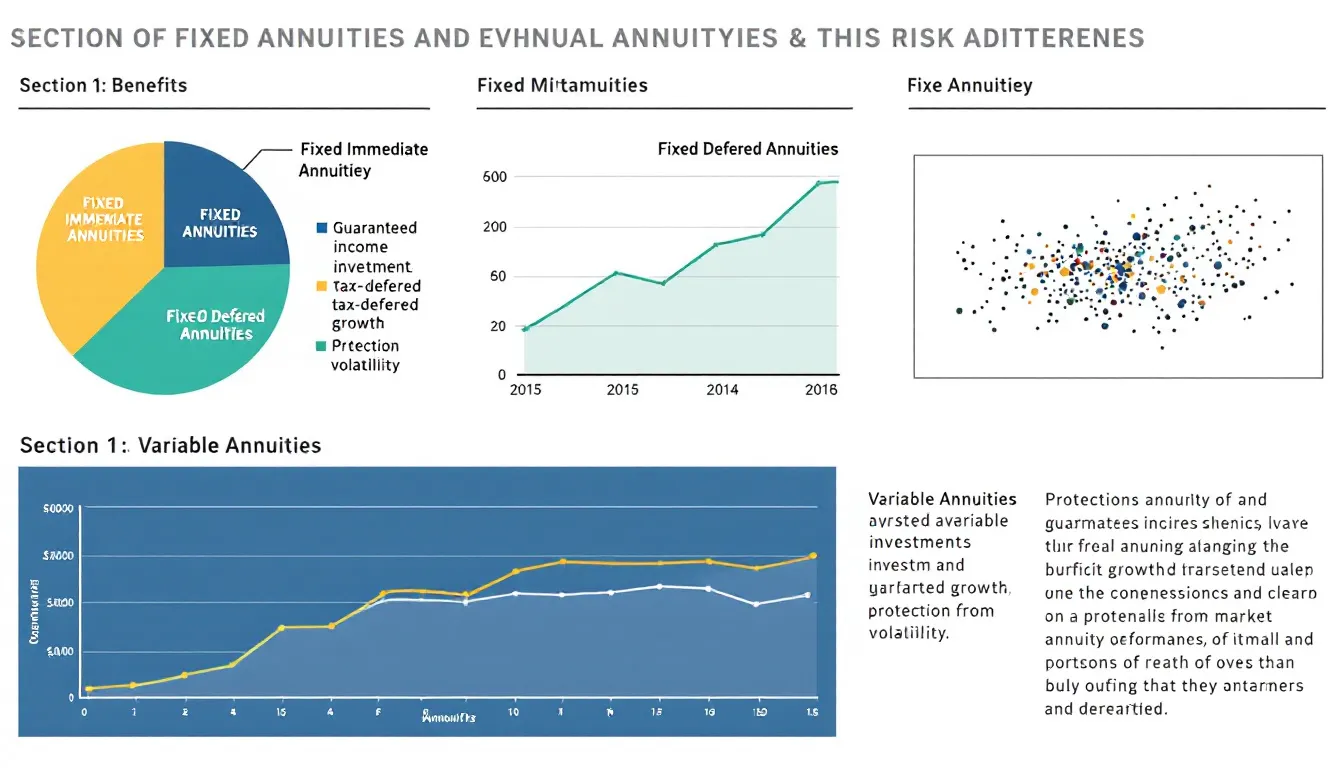Yes, you can lose money with an annuity. Although annuities aim for steady income, they carry risks. Market downturns, high fees, early withdrawal penalties, and insurer stability can affect your returns. This article examines these risks and addresses the question: “Can I lose money with an annuity?” and how they can impact your investment.
Key Takeaways
- Annuities, including fixed, variable, and deferred types, offer different benefits and risks, with fixed annuities providing principal protection and variable annuities exposing investors to market volatility.
- Investors may lose money with variable annuities due to market performance, high fees, early withdrawal penalties, and insurer solvency issues, making it crucial to understand these risks.
- Consulting a financial professional and comparing annuities to other investment options helps investors make informed decisions that align with their retirement goals and risk tolerance.
Understanding the Basics of Annuities
An annuity is essentially a contract between an investor and an annuity company aimed at providing a steady income stream, typically for retirement purposes. When you purchase an immediate annuity, you pay premiums to an insurance company, which then invests the money and promises to make regular payments to you. These payments can be a reliable source of retirement income, helping to ensure you do not outlive your money through annuity contracts.
Annuities work by converting a large sum of money into a series of smaller, guaranteed payments. The amount you’ll receive depends on several factors, including:
- The type of annuity
- Your initial investment
- Age
- Life expectancy
- The performance of the annuity’s investments.
Most annuities offer advantages such as guaranteed returns and tax-deferred growth, making them an attractive option for many retirement savers. Let’s delve into the different types of annuities to better understand their unique features.
Fixed Annuities
Fixed annuities promise a specific rate of interest, ensuring steady returns for the investor. This type of annuity is known for guaranteeing both the rate of return and the amount of payout, providing a predictable income stream. Fixed annuities come in various forms, including:
- Indexed annuities: Provide a minimum guaranteed interest rate, protecting against market downturns while allowing for potential growth if the market performs well.
- Fixed-rate annuities
- Income annuities
- Fixed index annuities
- Fixed index annuity
Each offers unique benefits.
One of the main attractions of fixed annuities is principal protection. Regardless of market conditions, your initial investment is safeguarded, making it a safe option for those seeking stability and guaranteed income. The predictable nature of fixed annuities makes them a popular choice for retirees who prefer a conservative retirement strategy.
Variable Annuities
Variable annuities offer the potential for higher returns by allowing policyholders to choose from a variety of investment options, similar to mutual funds. However, these returns fluctuate based on market performance, making variable annuities more volatile compared to their fixed counterparts. The performance of these annuities is directly tied to the underlying subaccounts, which can include stocks, bonds, and other investment vehicles.
While variable annuities have the potential for market-like returns, they also carry significant risks. Poor market performance can lead to a decrease in the value of the annuity, impacting the overall returns. Therefore, it’s essential to weigh these risks against the potential rewards when considering a variable annuity as part of your retirement strategy and market index.
Deferred Annuities
Deferred annuities allow investors to grow tax deferred their funds on a tax-deferred basis until they begin receiving payments at a future date. This type of annuity is typically purchased with the intention of deferring income until retirement, providing a way to accumulate retirement savings tax-free through a deferred income annuity.
The key benefit of deferred annuities is the ability to grow investments without being taxed until withdrawals begin, which can be a significant advantage for long-term retirement planning.
Can You Lose Money With An Annuity?

The possibility of losing money with an annuity is a concern that warrants careful consideration. While annuities are generally designed to provide stable income, several scenarios can lead to financial losses. For instance, variable annuities without an income rider expose investors to market risks similar to those of mutual funds or ETFs, meaning poor market performance can reduce the account value. Additionally, high fees and commissions can erode investment returns.
Another risk factor is the early death of the annuity owner, particularly with life-only income annuities where no death benefit is specified. Insurer solvency is also a critical concern; if the issuing insurance company faces financial difficulties, it may impact the promised payouts.
Understanding these risks and their potential impact on your investing underlying funds retirement savings is crucial.
Risks Associated with Variable Annuities
Variable annuities come with inherent risks due to their dependence on market performance. As the value of these annuities can fluctuate in value based on the performance of the chosen investment options, investors are exposed to potential losses. This volatility makes it essential to consider other retirement savings options like mutual funds and ETFs, which may offer different risk and return profiles.
Comparing annuities with other investments can highlight the differences in risk and return, helping investors make informed decisions. Carefully evaluating how variable annuities fit into your overall retirement strategy is important, especially to determine if the potential for higher returns justifies the associated risks.
Early Withdrawal Penalties
Withdrawing from an annuity before a specific period often results in significant penalties known as surrender charges. These charges can start at 10% and gradually decrease over time, typically lasting a number of years. If you choose to withdraw from your annuity early, be prepared for these penalties, as they can leave you feeling withdrawn.
Reading the fine print of your annuity contract is important to understand the implications of early withdrawals and plan to avoid costly penalties.
Insurer Solvency Concerns
The financial stability of the issuing insurance company is crucial for the security of an annuity. If an insurance company fails, there could be missed payouts or even a loss of a portion of the purchase amount. Therefore, it’s essential to choose an insurer with strong financial strength ratings, which indicate their ability to withstand financial shocks.
Selecting a financially solid insurance company ensures that they can fulfill their promises when income payments start. The guarantees associated with fixed annuities are only as strong as the claims-paying ability of the issuer, making it vital to assess the insurer’s stability before purchasing an annuity.
How Different Types of Annuities Mitigate Risks

Different types of annuities employ various strategies to mitigate risks and provide a stable income stream. Fixed annuities, for example, usually offer a stable interest rate over a specified term, reducing investment risks.
Annuities can play a significant role in securing a consistent income annuity during retirement, balancing both security and growth potential.
Principal Protection in Fixed Annuities
Fixed annuities are a type of insurance product that provides guaranteed returns and helps protect the investor’s principal. The insurance company is responsible for paying promised income for a specified period or for the lifetime of the annuity holder. This principal protection ensures that the initial investment is safeguarded against market fluctuations, making it a reliable option for those seeking stability and regular income.
For investors looking for a conservative retirement strategy, fixed annuities offer a dependable source of income due to their guaranteed income features and principal protection. This makes them a suitable choice for individuals who prioritize financial security over higher returns.
Guaranteed Retirement Income Features
Many annuities allow for optional riders that enhance income guarantees, aiding in secure retirement funding. A guaranteed minimum income benefit rider, for example, promises a certain payout regardless of market performance. Guaranteed income is crucial for retirement planning as it provides a steady lifetime income stream, helping to ensure financial stability regardless of market fluctuations.
These features can be particularly beneficial for retirees who need predictable income to cover their living expenses. By incorporating guaranteed retirement income features into an annuity, investors can achieve a more secure and stable financial future.
Death Benefit Provisions
Certain annuities include death benefits that ensure beneficiaries receive a payout upon the annuity owner’s death. Typically, if no death benefit is specified, the remaining money belongs to the insurance company when the annuity owner dies. However, options like the ‘Life with refund’ guarantee that the beneficiary receives at least the amount paid into the annuity if the owner dies early.
Having death benefit provisions in place not only protects beneficiaries financially but also provides peace of mind to the annuity owner. This feature ensures that the investment can continue to support loved ones even after the annuity owner’s passing.
Evaluating Annuity Costs and Fees

Annuities typically come with various fees that can significantly affect overall returns. These costs can include:
- Annual fees
- Commissions
- Additional charges for optional features or riders Understanding these expenses is crucial for evaluating the true cost of an annuity and its impact on your retirement savings.
High Fees and Commissions
Commissions on annuities can range from 1% to 8% of the total value, which is considerably higher than many other investment products. In some cases, annuity commissions can be as high as 10% depending on the type of annuity purchased. These high fees can significantly impact the overall performance of annuity investments, making it crucial for investors to evaluate the cost before purchasing an annuity.
High fees and commissions can eat into the investment returns, reducing the benefits of the annuity. Considering these costs and comparing them with other investment options ensures you’re making a sound financial decision.
Surrender Charges Explained
Surrender charges are fees for early withdrawal from an annuity. If you surrender an annuity before a specified period, a surrender charge may be applied. These charges can be substantial and are designed to discourage early withdrawals, ensuring that the annuity can fulfill its intended purpose of providing long-term retirement income.
Making Informed Decisions About Annuities

Making informed decisions about annuities involves evaluating how they fit into your overall retirement strategy. Calculate known expenses and compare them with guaranteed income sources to determine if an annuity aligns with your financial objectives. Annuities offer similar tax benefits to traditional IRAs or 401(k)s, growing tax-deferred.
Incorporating annuities into retirement planning can help ensure steady income and efficient management of retirement funds. However, it’s essential to consider the high fees, low or no interest earned, and limited liquidity that can make annuities a poor investment choice for some. Evaluating the pros and cons within the annuity contract ensures alignment with your financial goals.
Consulting a Financial Professional
Collaborating with a financial advisor helps in understanding the complexities of annuities. A financial advisor can:
- Clarify the complexities associated with different annuity products
- Ensure that you understand the implications of each type of annuity and how it fits into your broader retirement strategy
- Provide insights into complex products
- Help investors avoid common mistakes
This makes annuity specialists an invaluable resource.
Consulting a financial professional can also help you evaluate the fees and commissions associated with different annuities, ensuring that you choose a product that offers the best value for your investment. By working with a knowledgeable advisor, you can make informed decisions that align with your financial goals and risk tolerance.
Comparing Annuities to Other Investments
Comparing annuities to other investments like mutual funds and ETFs can help investors understand the relative benefits and drawbacks of each option. While annuities offer guaranteed income and tax-deferred growth, other investments may provide greater liquidity and potentially higher returns. Evaluating these alternatives allows investors to choose investments that align with their financial goals and risk tolerance.
Carefully weighing the benefits and drawbacks of annuities compared to other investment vehicles is important. By considering factors such as fees, returns, and risk, investors can make informed decisions that support their long-term retirement strategy. Consulting a financial professional can also provide valuable insights into how different investments fit into your overall financial plan.
Summary
Annuities can be a valuable component of a comprehensive retirement strategy, offering guaranteed income and tax-deferred growth. However, understanding the potential risks, costs, and benefits is crucial for making informed decisions. By evaluating the different types of annuities, consulting financial professionals, and comparing annuities to other investment options, you can ensure that your retirement savings are managed effectively and aligned with your financial goals. Taking these steps will help you make confident decisions about your financial future.
Frequently Asked Questions
Can I lose money with a variable annuity?
Yes, you can lose money with a variable annuity because of poor market performance and the impact of high fees. It’s essential to carefully consider these factors before investing.
What are the penalties for early withdrawals from an annuity?
Early withdrawals from an annuity typically incur surrender charges, starting at around 10% and decreasing over time. It’s important to consider these penalties when planning your withdrawal strategy.
How can I protect my principal investment in an annuity?
To protect your principal investment in an annuity, consider opting for fixed annuities, which provide a safeguard against market volatility and ensure your initial investment remains intact.
What are the benefits of consulting a financial professional when considering annuities?
Consulting a financial professional can clarify the complexities of annuities, assess associated fees, and ensure the annuity aligns with your overall retirement strategy. This guidance is essential for making informed financial decisions.
How do annuities compare to other investments like mutual funds?
Annuities provide stability through guaranteed income and tax-deferred growth, whereas mutual funds often offer better liquidity and the potential for higher returns. Ultimately, the choice depends on your financial goals and risk tolerance.

